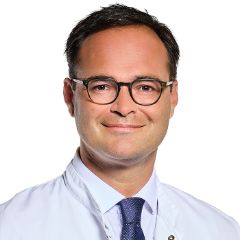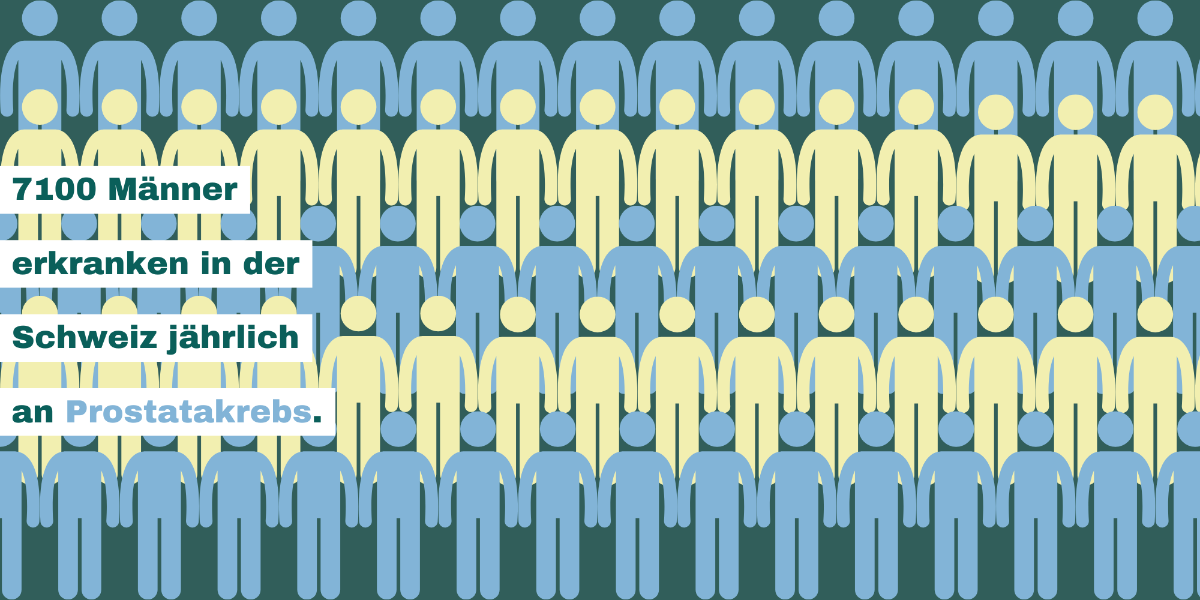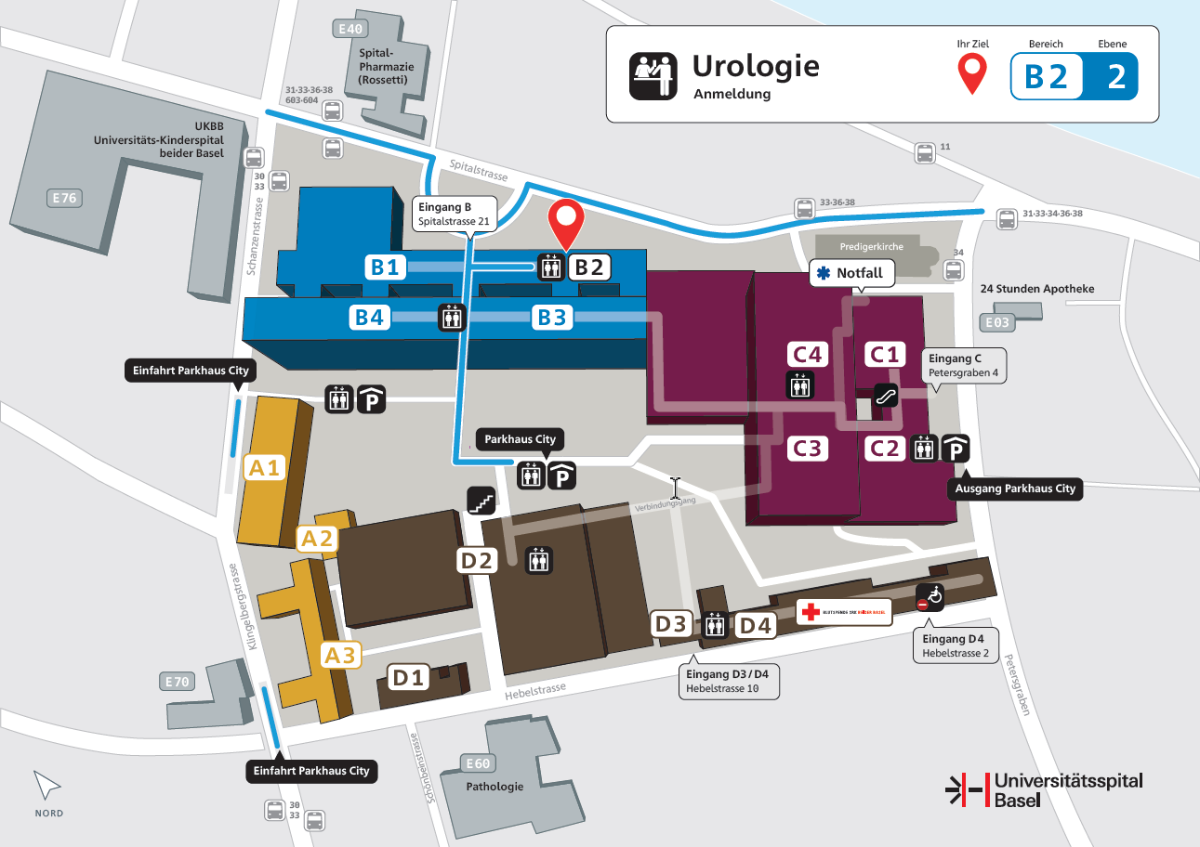Detected early, treated well.
Prostate cancer screening makes a significant contribution to men's health.
Stay strong - take care of your health!
Prostate cancer screening at the University Hospital Basel - step by step
2. come to the prevention
With a preventive appointment, you are investing directly in your health.
The first step is a detailed consultation with one of our specialists.
We will then carry out a blood test, a urine test and an ultrasound examination of the kidneys and bladder.
3. result received
A detailed report with all the findings will then be sent to you and your family doctor.
In Switzerland, prostate cancer is the most common cancer in men.
Many men ask themselves whether they should go for a screening examination or not.
We recommend it:
If prostate cancer runs in your family and you have a father or brother who has prostate cancer, talk to your doctor about a possible screening test from the age of 40.
All other men are recommended to talk to their doctor about prostate cancer screening from the age of 50.

You are in good hands with our specialists




Your advantages at the University Hospital Basel
Specialists at the University Hospital Basel
Our team of experienced and innovative doctors offers you a wide range of treatment options for benign and malignant prostate changes.
Our clinic environment enables interdisciplinary cooperation between different specialist areas and gives patients access to highly qualified diagnostics and optimal treatment.
Holistic medical care
Everything from a single source.
We are also there for you after your check-up and support you before, during and after your treatment. Comprehensive and personal advice for our patients is always our top priority.
State-of-the-art medicine and innovative methods
As a university hospital, research is particularly important to us. In addition to conducting our own studies, we are also actively involved in national and international projects, particularly in prostate cancer research.
This enables our patients to benefit from innovative treatment options at an early stage.
We are also leaders in robotic surgery and offer the entire spectrum of minimally invasive surgical methods.
Brochure for patients on the subject of prostate cancer
We recommend the information brochure "Early detection of prostate cancer - questions and answers" from the Swiss Cancer League. There you will find further useful information on the subject.
Frequently asked questions about the appointment

Why is early detection so important?
In Switzerland, prostate cancer is the most common cancer in men. Just over half are between 50 and 70 years old at the time of diagnosis.
The earlier a tumor is identified, the better the chances of recovery.
If the tumor grows within the prostate (i.e. is confined to the prostate), the chances of recovery are well over 95%.
What is the prostate?
The prostate is a gland that belongs to the internal sexual organs of men and is about the size of a walnut.
It is located below the bladder and surrounds the upper part of the urethra. The prostate is involved in sperm production, ejaculation and hormone metabolism.
What symptoms should I look out for?
In the early stages, prostate cancer often goes unnoticed.
Possible signs include a frequent urge to urinate, a weak urine stream, pain when urinating or blood in the urine.
However, these symptoms can also have other causes: An inflammation of the prostate or a benign enlargement of the prostate, for example. This can be determined during a screening examination.
If such symptoms occur, a doctor should be consulted in any case.
How long does the check-up take?
You will receive a 30-minute appointment from us.
We will discuss the advantages and disadvantages of the screening examination with you and answer any questions you may have.
We will then take a blood sample, check your urine and carry out an ultrasound examination of your kidneys and bladder.
Is it necessary to prepare for the check-up?
We ask you to bring an identification document and your health insurance card to the appointment.
And please come with a full bladder.
What does the check-up cost?
The coverage of costs may vary depending on the health insurance company and insurance model.
As prostate cancer screening is not a preventive measure under the KVG, we recommend that you consult your health insurance provider.
When will I receive the results of my examination?
We can inform you of the results of the test directly during the preventive consultation. The evaluation of the laboratory values takes approx. 2-3 days.
If the screening test is abnormal, your doctor will discuss the next steps and treatment options with you.
What does the PSA value stand for?
The measurement of the PSA value is an important part of the examination for the early detection of prostate cancer.
To measure the PSA value, some blood is taken and examined in the laboratory.
PSA is a prostate-specific antigen, a protein that is produced in the prostate.
An elevated value can indicate prostate cancer, but can also have other causes.
What does an elevated PSA value mean?
If the PSA value is less than 2-3 ng/ml, prostate cancer can be ruled out for the time being. We recommend regular follow-up checks.
If your PSA level is elevated, your doctor will discuss the follow-up examinations with you.
Why is prostate screening important?
PD Dr. Christian Wetterauer on the reasons to opt for prostate cancer screening:
Further information
Around 7,100 new prostate cancer diagnoses are made in Switzerland every year. This makes prostate cancer the most common cancer in men in Switzerland.
This makes screening all the more important. If prostate cancer is detected early, i.e. before it causes symptoms, there is a >90% chance of recovery for those affected.

As a central hospital, the University Hospital Basel offers the entire spectrum of bladder, kidney, prostate, testicular and penile surgery. We specialize in minimally invasive surgical methods (laparoscopy, retroperitoneoscopy, robotic surgery and laser surgery), including for cancer.

Directions and contact

Address
|
University Hospital Basel |
By streetcar
| Take streetcar line 11 to the University Hospital station and then follow Spitalstrasse on foot for about 250m to the entrance. |
By car
| Please use the parking garage City, entrance Schanzenstrasse or Klingelbergstrasse. |
Contact us
Urology registration office
Availability: Mon-Fri, 08.00 - 16.00 hrs




